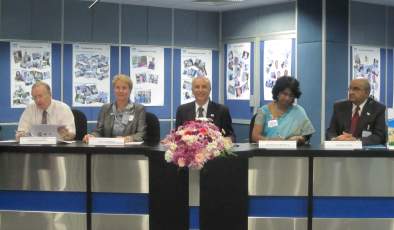More than 70 practitioners and researchers attended the workshop, “Climate Change, food, and water security: Identifying critical issues and exploring cooperative strategies in an age of increased risk and uncertainty for South Asia.” The workshop was a joint initiative of the Global Water Partnership (GWP) and the International Water Management Institute (IWMI). Participants came from Bangladesh, Bhutan, India, Nepal, Pakistan, Sri Lanka, and the international community.
“If there was one clear message from the workshop, it was that business as usual will not do,” said Dr. Mohamed Ait-Kadi, Chair of the GWP Technical Committee. “Participants openly acknowledged the region’s inter-sectoral challenges in water and food security, but they sought to move the debate from hand-wringing over political and bureaucratic barriers toward the steps needed to realize the latent potential of regional and international cooperation in sharing knowledge, information and experiences. South Asia is not short of talent,” said Dr. Ait-Kadi.
While many proposals surfaced during the workshop and several will be developed in the coming months, two specific initiatives were discussed:
- A regional agricultural extension programme for farmers from one country to share information with those of another on the techniques to improve the performance of irrigated agriculture;
- A programme on integrated drought and flood monitoring and forecasting. This would build on existing country expertise and encourage regional cooperation.
In addition, Dr. David Molden, Deputy Director of IWMI, presented the CGIAR Research Programme on Water, Land and Ecosystems, and invited GWP to participate as a partner, especially at the point where research has to be translated into policies and practices by institutions.
“The nexus of climate change, water and food security pose a ‘wicked set’ of issues going forward and the current effort is nowhere near what is needed to deal with the challenge,” said Dr. Molden. “But on-the-ground programmes such as the ones being proposed are a practical step forward that can make a difference to peoples’ livelihoods.”
South Asia is among the areas expected to be hardest hit by climate change. Severe flooding in 2007 along the Ganges and Brahmaputra rivers affected over 13 million people in Bangladesh; flooding in Pakistan in 2010 severely affected 20 million people. India has suffered extreme rainfall, flooding and droughts, in addition to a drastic drop in groundwater levels due to overexploitation. Sea level rise is a threat to low lying areas of Bangladesh and Sri Lanka. And glacier melt will impact Nepal.
“Increased risk and uncertainty were recurring themes,” said Dr. Uma Lele, member of the GWP Technical Committee, who helped designed the workshop’s scientific content in collaboration with Dr. Tushaar Shah. Dr. Shah is also a GWP Technical Committee member and a Senior Advisor for IWMI. Despite rapid economic growth, South Asia has the largest incidence of global poverty and faces immense pressure on land and water resources, due to a combination of population growth, slowing growth in agricultural productivity, rapid urbanization, and shifts in demand for foods which are more demanding of water and other natural resources. “The current rudimentary state of methodological tools to deal with risk and uncertainty call for cutting edge research to address policies and investment choices,” said Dr. Lele.
The workshop demonstrated both the need as well as the possibilities for strengthening the existing GWP South Asia regional partnership as a platform for action. A robust and well-funded platform could:
- Identify regional research, training and communication needs, and stimulate new research
- Link researchers, advocates and practitioners in and outside the region
- Develop and implement relevant programmes enabling regional cooperation through joint projects and programmes that might emerge from the workshop
Some participants expressed concern that climate change is diverting attention from the perennial issues of water management which remain unaddressed, and that the new climate funds will overlook the investments needed in water. “If anything, climate change provides an opportunity to highlight the relevance and urgency of better water resources management in order to meet the challenges,” said Dr. Ania Grobicki, GWP Executive Secretary. “Investing in water contributes both to poverty reduction now and to climate resilience in the long-term.”
Even without climate change, major improvements are needed to start using existing information for improved decision making in order to:
- Generate better information on water budgets
- Move from engineering hardware solutions to softer issues of institutional changes
- Address more systematically the cycle of surface water, groundwater, and rainfall
- Address pricing and subsidies
- Reform of institutions at all levels
- Improve outmoded legal frameworks
The most animated discussions took place around the ‘upstream’ issues of the interaction between policies and politics. Why are lessons not being implemented? One explanation included a lack of agreement on the lessons such as the priority accorded to the allocation of resources towards surface water or groundwater. Another was whether new knowledge can influence decision making in the face of vested interests. And a third was whether further work is needed on developing incentives for reforms.
For more information, contact:
Harshini De Silva
Communications Officer
Global Water Partnership South Asia
Tel: +94 11 2880000
Fax: +94 11 2786854
Mobile: 0777 623991
E-mail: H.deSilva@cgiar.org
Website: www.gwpsouthasia.org
Dawn Rodriguez
Communications Coordinator/Writer
International Water Management Institute
Tel: +94-11 2880000
Fax: +94-11 2786854
Mobile: 077 5982458
E-mail: d.rodriguez@cgiar.org
Website: www.iwmi.org
(Photo: IWMI Director Colin Chater, GWP Executive Secreatry Dr Ania Grobicki, GWP Technical Committee Chair Dr Mohamed Ait-Kadi, Sri Lanka Water Partnership Chair Kusum Atukorala and GWP South Asia Chair Sardar Tariq)
